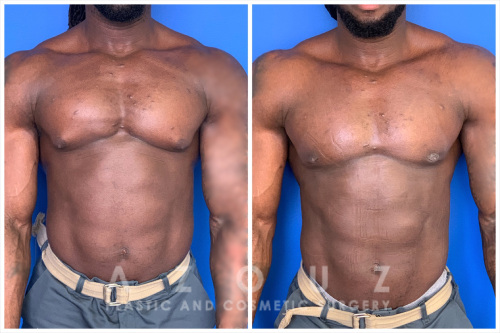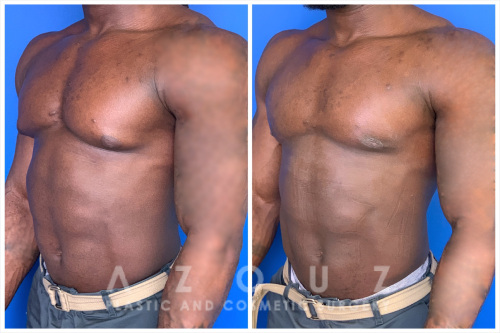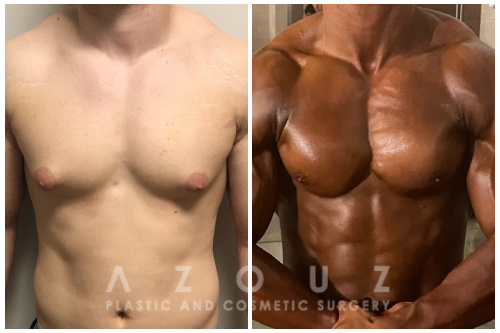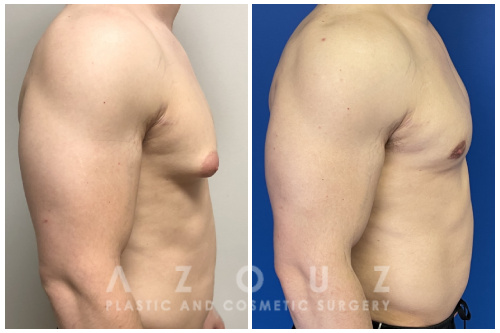Request A Consultation
Treatment of Gynecomastia after Steroid Use
Gynecomastia is a long-lasting side effect of anabolic steroids. It refers to enlarged breast tissue in men, distinct from weight gain-related pseudogynecomastia. Gynecomastia causes stubborn breast tissue that does not respond to weight loss or exercise. Fatty tissue can be trapped between breast tissue and is hard to lose. Even if you weren’t a professional bodybuilder but used anabolic steroids to enhance your physique at some point, you may develop the condition. Azouz Plastic and Cosmetic Surgery features experienced board-certified plastic surgeons specializing in gynecomastia treatment following steroid use.
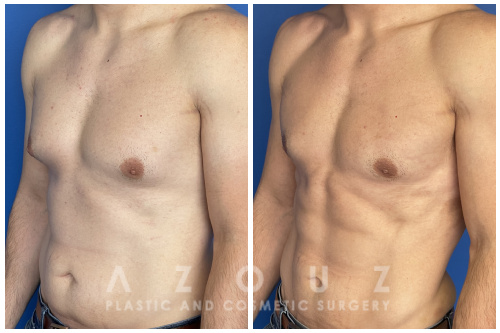
This thirty two year old man was bothered by stage 2 gynecomastia. He was also interested in removing stubborn fat from his abdomen. He underwent a Daddy Do-Over with glandular removal of his male breasts and liposuction of his chest and abdomen. He was extremely happy with the scarless results and quick recovery.
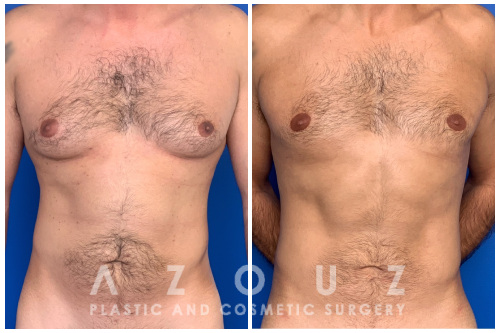
This young man complained of gynecomastia since he was a teenager and was conscious of wearing tight shirts. He underwent minimally invasive male breast reduction with liposuction and gland removal. His results demonstrate a flatter chest and scarless results.

This man was bothered by his chest asymmetry, as his left breast was larger than his right breast. He underwent gynecomastia surgery to remove the male breast tissue and liposuction of stubborn chest fat. Dr. Azouz used specialized techniques to improve skin laxity and reduce the need for additional skin removal surgery. He felt much more confident after his surgery.
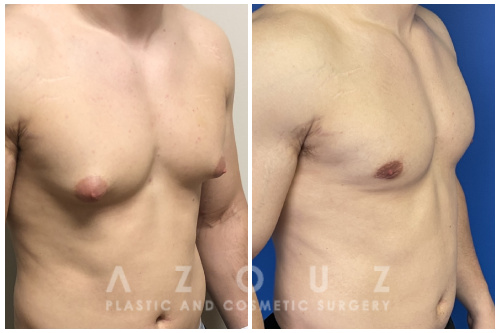
This young man reported that most men in his family had gynecomastia, as it is hereditary. He was bothered by his puffy nipples and complained of grade 3 gynecomastia. He had liposuction and removal of the glandular breast tissue to achieve a flat, more masculine chest. He was very happy with the results and felt more comfortable in tight-fitting shirts.
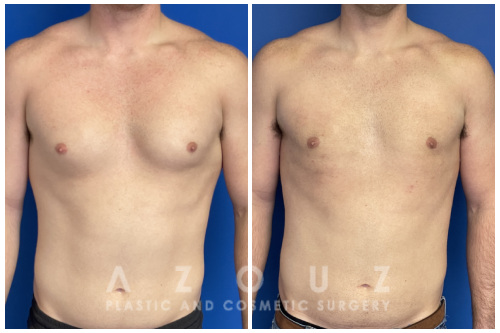
This young man complained of “man boobs” since he was a teenager that did not improve with diet or exercise. He chose to undergo minimally invasive gyno surgery to treat grade 1 gynecomastia and achieve a flat, more masculine chest.
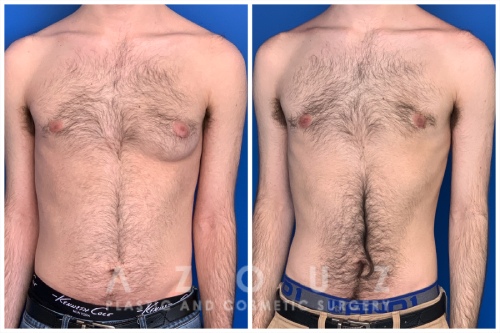
This man was bothered by chest asymmetry, as his left breast was larger than his right. He had mild grade 1 gynecomastia of his right breast and grade 2 gynecomastia of his left breast. He underwent liposuction and the removal of both male breasts to achieve a symmetrical, flat chest. He was thrilled with the results and felt more comfortable with a masculine chest.
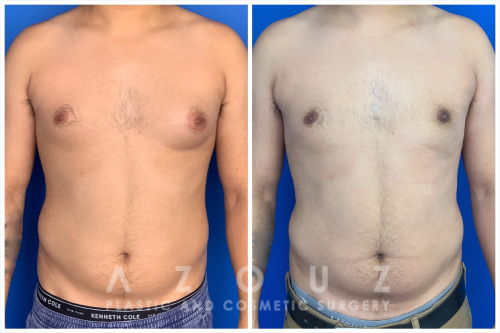
This man was bothered by his male breasts and chest asymmetry. He stated that his gyno did not go away with exercise. He desired liposuction and gland removal of both man boobs to achieve a flatter symmetrical chest. He was happy with a quick recovery and scarless results.
Signs of Gynecomastia after Steroid include:
- Large or rounded breasts without muscle definition
- Uneven breasts or nipples
- Enlarged areolas and nipples
- Gyno nipples (swollen, puffy, or projecting)
- Feeling of “rocks” and “pebbles” around the chest.
Gynecomastia from Steroids Signs and Symptoms
Gynecomastia can negatively affect a person’s psychosocial well-being, regardless of their bodybuilding status. Breast tissue and puffy nipples may lead men to avoid shirtless activities. Some men wear loose shirts or sweaters to hide their chest. Gynecomastia, or “gyno,” negatively impacts self-esteem, relationships, and mental health.
Steroid use is a common cause of man boobs, but not unique. Serious underlying conditions can cause gynecomastia. Board-certified plastic surgeon Dr. Azouz will obtain a full medical history and examination to rule out other conditions. The most effective known treatment for gynecomastia is surgical excision with liposuction.
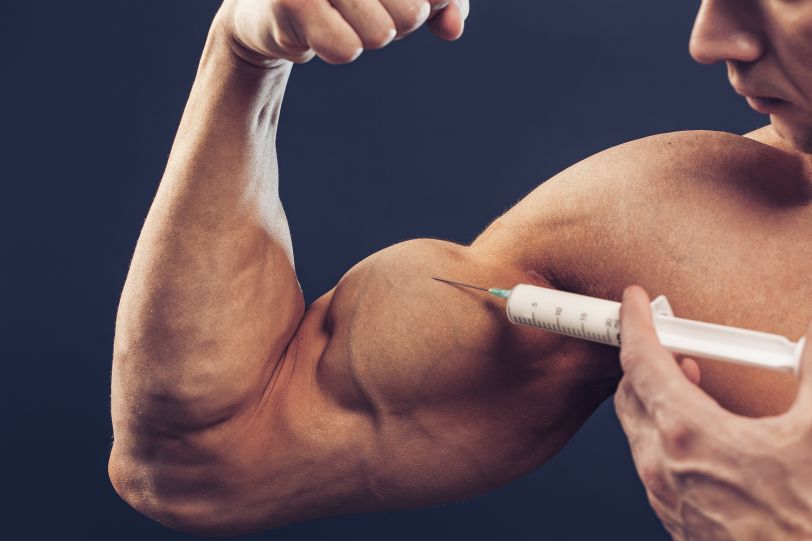
Why Choose Top Gynecomastia Surgeon Dr. Azouz in Dallas

What are Anabolic Steroids?
Steroids are synthetic hormones that mimic testosterone’s effects in the body. Athletes and bodybuilders use them to increase muscle mass and strength. Steroid use can lead to serious side effects, such as gynecomastia.
How do Steroids cause Gynecomastia?
Steroids can lead to gynecomastia by raising estrogen levels in the body. Steroid use suppresses natural testosterone production, resulting in higher estrogen levels. Elevated estrogen levels can lead to abnormal breast tissue growth resulting in gynecomastia.
Nonsurgical Treatment versus Surgery for Gynecomastia after Steroid Use
The most effective treatment for gynecomastia is surgery. Dr. Azouz uses a minimally invasive approach for gynecomastia surgery. Dr. Azouz can use a single incision to hide the scar within the areola for most men. This procedure removes excess breast tissue, typically using liposuction and excision.
Gynecomastia surgery at Azouz Plastic Surgery is an outpatient procedure, allowing patients to return home the same day. Dr. Azouz primarily uses local anesthetic with sedation for gynecomastia surgery, allowing for a faster recovery than general anesthetic.
Gynecomastia in men can result from various factors, including genetics, medications, supplements, obesity, and steroid use. Common medications for gynecomastia are often ineffective and may pose complications that are riskier than surgery.
Medication for Gynecomastia after Steroid Use
Surgery is the most effective treatment for gynecomastia, yet many physicians still prescribe medications for it. While several medications are prescribed for gynecomastia, Dr. Azouz generally does not recommend these medications, as surgery is the gold standard for treating gynecomastia.
- Tamoxifen is an estrogen blocker prescribed for women with breast cancer. When treating gynecomastia, it is often given chronically. Patients often report that tamoxifen does not eliminate existing gynecomastia. Long-term tamoxifen use can lead to various side effects, including serious blood clots.
- Aromatase inhibitors block estrogen production. Similar to Tamoxifen, these drugs are prescribed for female breast cancer and are used by patients to treat or prevent gynecomastia. Patients report little to no benefit from aromatase inhibitors for gynecomastia. Aromatase inhibitors may cause serious blood clots.
- Selective Androgen Receptor Modulators (SARMs) mimic the effects of testosterone in the body, similar to anabolic steroids. Patients often use SARMS instead of anabolic steroids, believing they are safer. SARMs can cause side effects such as gynecomastia, liver damage, reduced libido, and inhibit testosterone production. SARMs are banned in sports, similar to anabolic steroids.
Gyno Surgery in Dallas, TX
Gynecomastia after steroid use can leave you with many regrets and concerns, but it is not a condition you have to live with. Liposuction, breast tissue removal, nipple repositioning, and chest contouring can all restore your natural, more masculine-appearing chest. Incisions can often be camouflaged in order to minimize visible scarring.
As one of the most sought-after plastic surgeons in Texas, Dr. Azouz is highly experienced in treating gynecomastia after steroid use. Dr. Azouz has many decades of experience in restoring form and function with natural-looking results. Contact Azouz Plastic and Cosmetic Surgery today for a consultation.
Request A Consultation
Frequently Asked Questions
Steroid-Related Gynecomastia
Yes, gynecomastia surgery for steroid users frequently necessitates accurate glandular tissue excision, as the condition is characterized by thick glandular growth.
Steroid use can raise the risk of problems such as scar formation and delayed healing caused by tissue alterations. Fortunately, Dr. Azouz has years of experience with treating gynecomastia after steroid use.
Surgery does not stop people from using steroids in the future, but continuing to use steroids raises the risk of gynecomastia coming back. To sustain surgical results, avoid steroids and other medications that alter hormonal balance. It is essential that you continue to follow up with Dr. Azouz to monitor your health.
